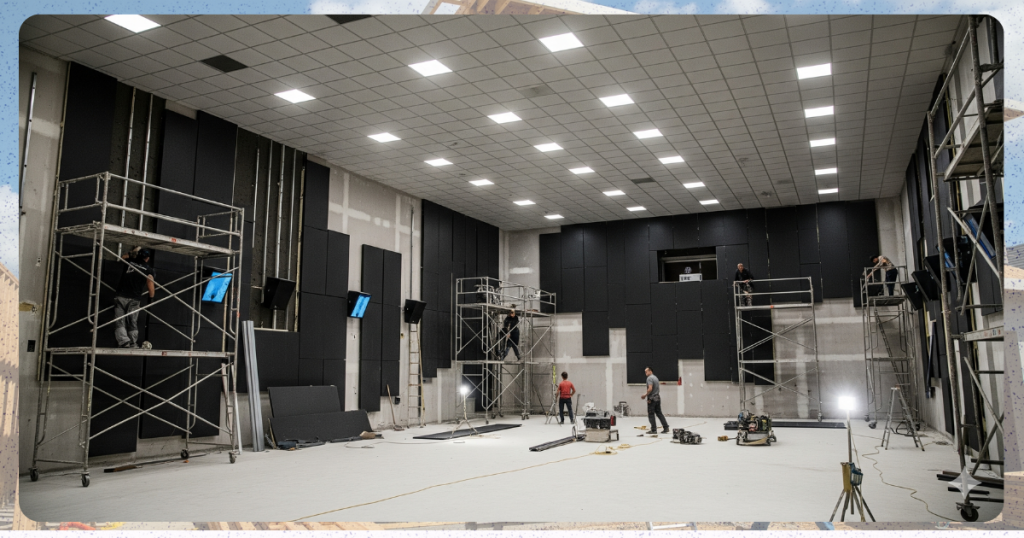Construction projects succeed because of the skilled people working behind the scenes. Subcontractors bring in specialized knowledge, whether in window installation, soundproofing, flooring, or other key areas that keep a project moving smoothly. By focusing on one specialty, you can stand out as the go-to expert that builders and clients trust for quality results.
In this article, we will explore six construction specialties that are in demand today and show how mastering them can open doors to a successful subcontracting career.

What is a Subcontractor?
A subcontractor is a skilled professional hired to perform a specific part of a construction project. Instead of managing the entire build, subcontractors concentrate on specialized tasks such as flooring, glazing, or landscaping.
Anyone who takes on a project can be the primary contractor in one situation and a subcontractor in another. It all depends on the terms of the contract. For example, an HVAC contractor may serve as the primary contractor on one project, while on another, they might subcontract work that involves electrical wiring or controls.
This flexibility allows contractors and subcontractors to collaborate effectively, ensuring every detail of a project is handled by the right experts.
6 Construction Specialty Skills You Can Master
1. Glazing subcontractors – windows, curtain walls, glass systems

Glass brings style and function to modern buildings. Glazing subcontractors work with windows, curtain walls, and large glass systems that make spaces feel brighter and more open.
Training in glass installation, safety handling, and certification programs will help you qualify for projects in both residential and commercial developments.
2. Landscape subcontractors – softscape, hardscape, irrigation systems

Green spaces make any property more inviting. Landscape subcontractors design and build gardens, turf areas, decks, and irrigation systems that enhance both homes and commercial properties.
Horticulture courses and landscaping design certifications provide the knowledge to create outdoor spaces that are both functional and beautiful.
3. Flooring subcontractors – tiles, carpet, wood, vinyl

Floors complete the look of a space. Flooring subcontractors specialize in installing tiles, wood, vinyl, and carpets for residential and business projects.
Hands-on training, product-specific certifications, and apprenticeships with flooring experts can open the door to more opportunities in this trade.
4. Security system subcontractors – CCTV, alarms, access control

Safety is a top priority for property owners. Security system subcontractors handle the installation of CCTV, alarms, and access control systems for homes and offices.
With a low-voltage technician license and vendor-specific training, you can deliver reliable solutions that keep people and properties protected.
5. Solar/renewable energy subcontractors – solar panels, geothermal systems

Sustainable construction is on the rise. Solar and renewable energy subcontractors install solar panels, geothermal systems, and other green technologies that reduce energy costs and environmental impact.
Completing renewable energy training programs and earning certifications equips you to meet the growing demand for eco-friendly systems.
6. Acoustical subcontractors – soundproofing, acoustic ceiling systems

Comfort often depends on sound. Acoustical subcontractors handle soundproofing and acoustic installations that improve the atmosphere of offices, theaters, and residential spaces.
Training in acoustical installation or gaining on-the-job experience prepares you to provide solutions that make every environment more pleasant.
What to learn more about the common types of primary construction contractors? Here’s an article about that: Construction Business ang Papasukin?: Here are 6 Primary Contractor Classification na Pwede Mong Pasukin Bilang Negosyo!
Building Your Subcontracting Career
Mastering a specialty gives you a strong edge in the construction industry. With the right skills, certifications, and training, you become an essential part of every project.
Start by choosing a field that excites you, then invest in continuous learning to grow your expertise and reputation as a trusted subcontractor.
References
American Institute of Constructors. (n.d.). General Contractor vs. Specialty Contractor Roles Explained. American Institute of Constructors. https://aic-builds.org/general-contractor-vs-specialty-contractor/
Jones, G. (n.d.). 14 Key Types of Construction Subcontractors. AutoDesk. https://www.autodesk.com/blogs/construction/types-construction-subcontractors/
Scalisi, T. (2025, July 28). Types of Subcontractors in Construction. Procore. Retrieved August 29, 2025, from https://www.procore.com/library/types-of-subcontractors-construction










